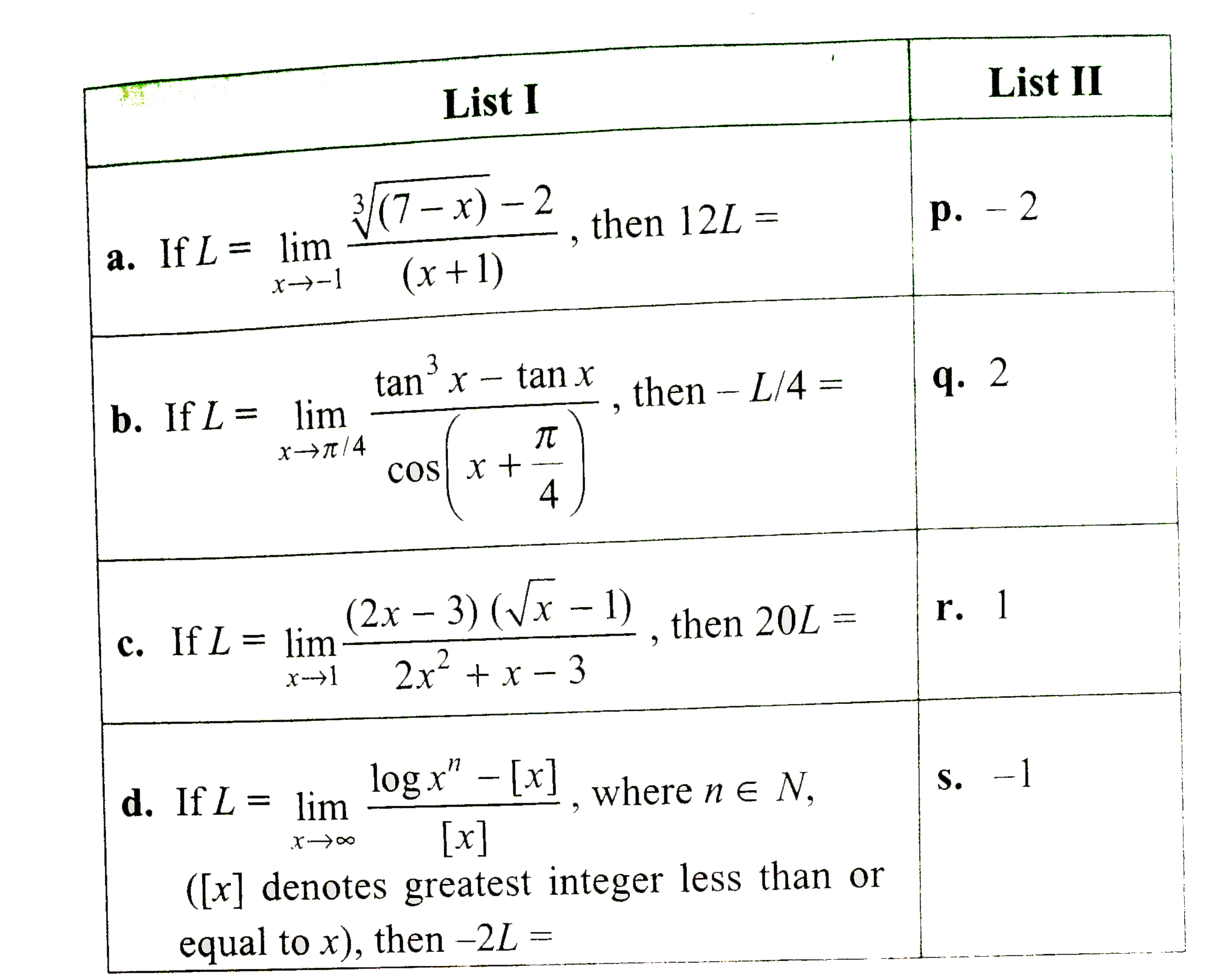limx→0(2m+x)1/m−(2n+x)1/nx is equal toSolution in Bengali
(n!)n
(n!)1/n
n!
ln(n!)
The correct Answer is:C
limx→0(2m+x)1/m−(2n+x)1/nx
limx→0(2m+x)1/m−2x−limx→0(2n+x)1/n−2x
=lima→2a−2am−2m−limb→0b−2bn−2n
[Putting 2m+x=am and 2n+x=bn]
=1m2m−1−1n2n−1
Topper's Solved these Questions
- BOOK - CENGAGE PUBLICATIONCHAPTER - LIMITSEXERCISE - Linked Comprehension Type20videos
LIMITS
- BOOK - CENGAGE PUBLICATIONCHAPTER - LIMITSEXERCISE - Matrix Match Type5videos
LIMITS
- BOOK - CENGAGE PUBLICATIONCHAPTER - LIMITSEXERCISE - EXERCISE 2.88videos
LIMITS
- BOOK - CENGAGE PUBLICATIONCHAPTER - JEE 2019EXERCISE - Chapter 108videos
JEE 2019
- BOOK - CENGAGE PUBLICATIONCHAPTER - LINEAR COMBINATION OF VECTORS, DEPENDENT AND INDEPENDENT VECTORSEXERCISE - DPP 1.210videos
LINEAR COMBINATION OF VECTORS, DEPENDENT AND INDEPENDENT VECTORS
Similar Questions
Letf(x)=sin−1(1−{x})×cos−1(1−{x})√2{x}×(1−{x}), where {x} denotes the fractional part of x.
L=limx→0−f(x) is equal to02:44View SolutionMatch the following lists:
 02:58View Solution
02:58View SolutionEvaluate limx→1cosπ2x1−√x
02:23View SolutionIf y = y(x) is the solution of the differential equation, xdydx+2y=x2 satisfying y(1) = 1, then y(12) is equal to
03:56View SolutionThe number of integral values of p for which (p+1)ˆi−3ˆj+pˆk,pˆi+(p+1)ˆj−3ˆk and −3ˆi+pˆj+(p+1)ˆk are linearly dependent vectors is q
01:47View Solutionlim_(x rarr1)(x^((1)/(n))-1)/(x^((1)/(m))-1)(m and n are integers is equal
06:07View Solutionlim_(x->0) [(2^m +x)^(1/m)-(2^m+x)^(1/n)]/x a) 1/(m2^m)-1/(n2^n) b) 1/(m2^(m-1))-1/(n2^(n-1)) c) m/2^(m-1)-n/2^(n-1) d) none of these
01:36View Solutionlimx→1xm−1xn−1 is equal to
02:25View Solutionlimx→0(2m+x)1/m−(2n+x)1/nx is equal to
02:31View SolutionWhat is limx→0(1+x)n−1x equal to ?
03:34View Solution(i) limx→axm−amxn−an (ii) limx→0(1+x)1/n−1x
10:54View Solutionlimx→axm−amxn−an is equal to
04:01View SolutionIf f(x)=log(m(x)n(x)),m(1)=n(1)=1 and
m'(1)=n'(1)=2, thenf'(1) is equal to03:33View SolutionEvaluate limx→0(1+x)m−1(1+x)n−1
02:01View Solutionlimx→1xm−1xn−1 is equal to
03:33View SolutionIf f(n)=limx→0{(1+sinx2)(1+sinx22)...(1+sinx2n)}1x then find limn→∞f(n).
04:30View Solution

